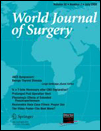The Effect of Surgical Subspecialization on Outcomes in Peptic Ulcer Disease Complicated by Perforation and Bleeding
Presented in part at the Association of Surgeons of Great Britain and Ireland Annual Congress, Glasgow, Scotland, 13–15 April 2005, and the Royal College of Surgeons of Edinburgh Quincentenary Congress, Edinburgh, Scotland, 29 June–1 July 2005.
Andrew J. Robson and Jennifer M. J. Richards contributed equally to this study.
Abstract
Background
Emergency surgical services in Edinburgh were restructured in July 2002 to deliver subspecialist management of colorectal and upper-gastrointestinal emergencies on separate sites. The effect of emergency subspecialization on outcome from perforated and bleeding peptic ulceration was assessed.
Methods
All patients admitted with complicated peptic ulceration (January 2000–February 2005) were identified from a prospectively compiled database.
Results
Perforation: 148 patients were admitted with perforation before the service reorganization (period A – 31 months) of whom 126 (85.1%) underwent surgery; 135 patients were admitted in period B (31 months) of whom 114 (84.4%) were managed operatively. The in-hospital mortality was lower in period B (14/135, 10.4%) than period A (30/148, 20.3%; P = 0.023; relative risk (RR), 0.51; 95% confidence interval (CI), 0.28–0.91). There was a significantly higher rate of gastric resection in the second half of the study (period A 1/126 vs. period B 8/114; P = 0.015; RR, 8.84; 95% CI, 1.48–54.34). Length of hospital stay was similar for both groups. Bleeding: 51 patients underwent operative management of bleeding peptic ulceration in period A and 51 in period B. There were no differences in length of stay or mortality between these two groups.
Conclusion
Restructuring of surgical services with emergency subspecialization was associated with lower mortality for perforated peptic ulceration. Subspecialist experience, intraoperative decision-making, and improved postoperative care have all contributed to this improvement.




